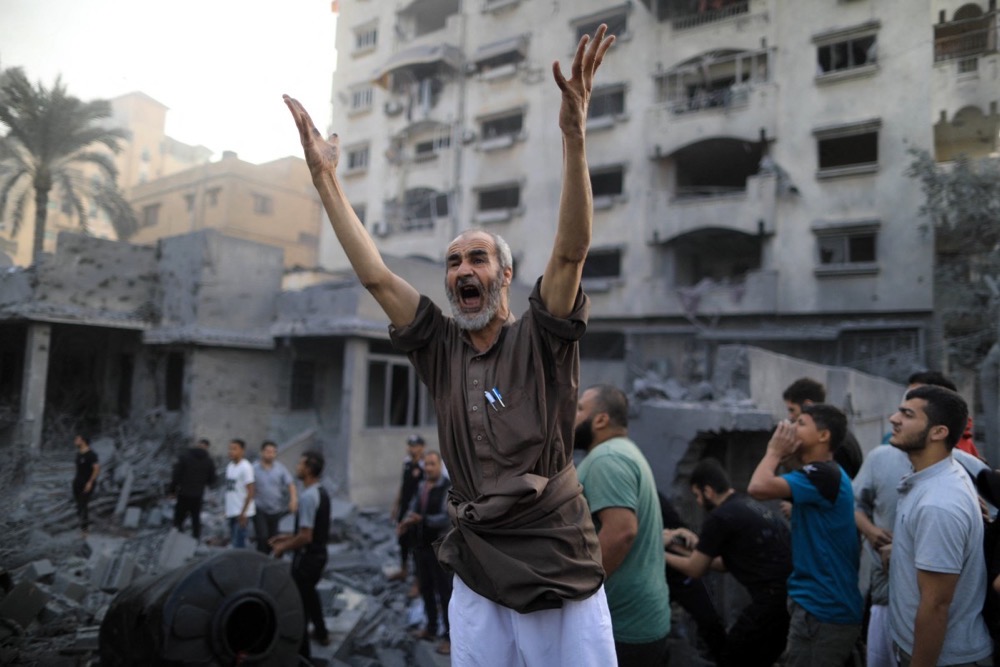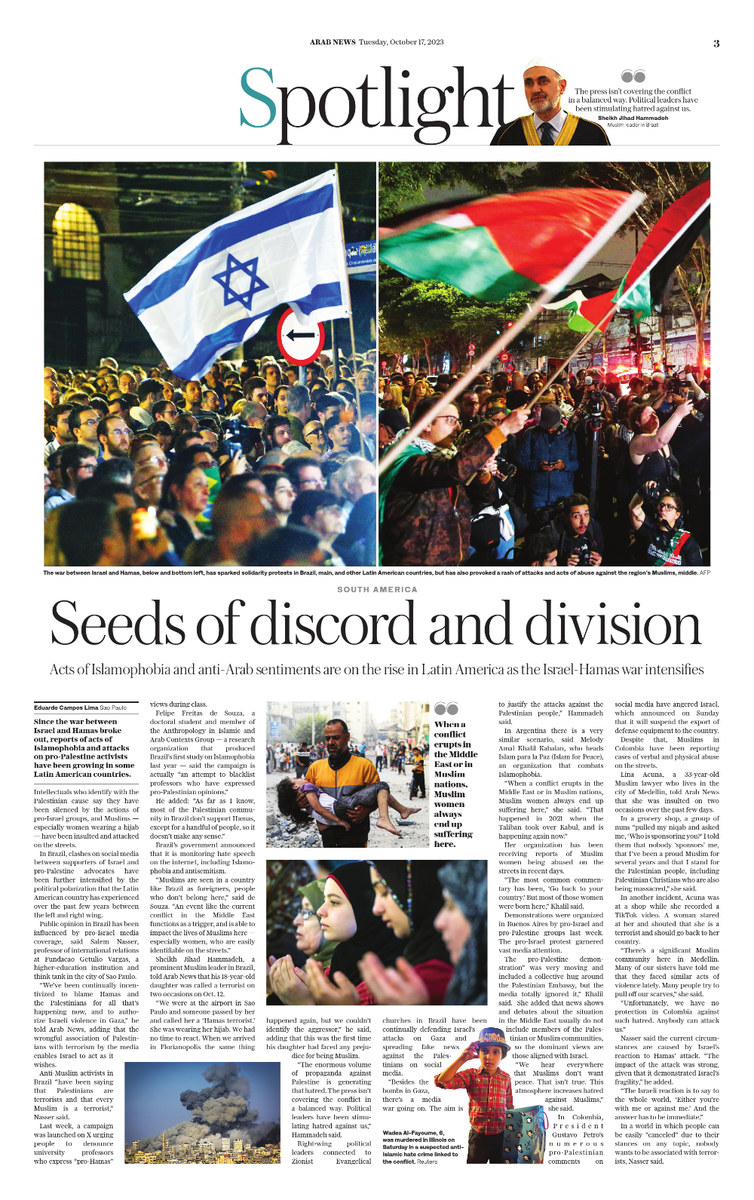SAO PAULO: Since the war between Israel and Hamas broke out, reports of acts of Islamophobia and attacks on pro-Palestine activists have been growing in some Latin American countries.
Intellectuals who identify with the Palestinian cause say they have been silenced by the actions of pro-Israel groups, and Muslims — especially women wearing a hijab — have been insulted and attacked on the streets.
In Brazil, clashes on social media between supporters of Israel and pro-Palestine advocates have been further intensified by the political polarization that the Latin American country has experienced over the past few years between the left and right wing.
Public opinion in Brazil has been influenced by pro-Israel media coverage, said Salem Nasser, professor of international relations at Fundacao Getulio Vargas, a higher-education institution and think tank in the city of Sao Paulo.

“Besides the bombs in Gaza, there’s a media war going on. The aim is to justify the attacks against the Palestinian people,” Hammadeh said.
“We’ve been continually incentivized to blame Hamas and the Palestinians for all that’s happening now, and to authorize Israeli violence in Gaza,” he told Arab News, adding that the wrongful association of Palestinians with terrorism by the media enables Israel to act as it wishes.
Anti-Muslim activists in Brazil “have been saying that Palestinians are terrorists and that every Muslim is a terrorist,” Nasser said.
Last week, a campaign was launched on X urging people to denounce university professors who express “pro-Hamas” views during class.
Felipe Freitas de Souza, a doctoral student and member of the Anthropology in Islamic and Arab Contexts Group — a research organization that produced Brazil’s first study on Islamophobia last year — said the campaign is actually “an attempt to blacklist professors who have expressed pro-Palestinian opinions.”
He added: “As far as I know, most of the Palestinian community in Brazil don’t support Hamas, except for a handful of people, so it doesn’t make any sense.”
Brazil’s government announced that it is monitoring hate speech on the internet, including Islamophobia and antisemitism.

Sheikh Jihad Hammadeh, a prominent Muslim leader in Brazil, told Arab News that his 18-year-old daughter was called a terrorist on two occasions on Oct. 12. (AFP)
“Muslims are seen in a country like Brazil as foreigners, people who don’t belong here,” said de Souza. “An event like the current conflict in the Middle East functions as a trigger, and is able to impact the lives of Muslims here — especially women, who are easily identifiable on the streets.”
Sheikh Jihad Hammadeh, a prominent Muslim leader in Brazil, told Arab News that his 18-year-old daughter was called a terrorist on two occasions on Oct. 12.
“We were at the airport in Sao Paulo and someone passed by her and called her a ‘Hamas terrorist.’ She was wearing her hijab. We had no time to react. When we arrived in Florianopolis the same thing happened again, but we couldn’t identify the aggressor,” he said, adding that this was the first time his daughter had faced any prejudice for being Muslim.
“The enormous volume of propaganda against Palestine is generating that hatred. The press isn’t covering the conflict in a balanced way. Political leaders have been stimulating hatred against us,” Hammadeh said.
Right-wing political leaders connected to Zionist Evangelical churches in Brazil have been continually defending Israel’s attacks on Gaza and spreading fake news against the Palestinians on social media.
“Besides the bombs in Gaza, there’s a media war going on. The aim is to justify the attacks against the Palestinian people,” Hammadeh said.

“The Israeli reaction is to say to the whole world, ‘Either you’re with me or against me.’ And the answer has to be immediate,” Salem Nasser, professor of international relations at Fundacao Getulio Vargas said. (AFP)
In Argentina there is a very similar scenario, said Melody Amal Khalil Kabalan, who heads Islam para la Paz (Islam for Peace), an organization that combats Islamophobia.
“When a conflict erupts in the Middle East or in Muslim nations, Muslim women always end up suffering here,” she said. “That happened in 2021 when the Taliban took over Kabul, and is happening again now.”
Her organization has been receiving reports of Muslim women being abused on the streets in recent days.
“The most common commentary has been, ‘Go back to your country.’ But most of those women were born here,” Khalil said.
Demonstrations were organized in Buenos Aires by pro-Israel and pro-Palestine groups last week. The pro-Israel protest garnered vast media attention.

Anti-Muslim activists in Brazil “have been saying that Palestinians are terrorists and that every Muslim is a terrorist,” Salem Nasser, professor of international relations at Fundacao Getulio Vargas said. (AFP)
The pro-Palestine demonstration” was very moving and included a collective hug around the Palestinian Embassy, but the media totally ignored it,” Khalil said.
She added that news shows and debates about the situation in the Middle East usually do not include members of the Palestinian or Muslim communities, so the dominant views are those aligned with Israel.
“We hear everywhere that Muslims don’t want peace. That isn’t true. This atmosphere increases hatred against Muslims,” she said.
In Colombia, President Gustavo Petro’s numerous pro-Palestinian comments on social media have angered Israel, which announced on Sunday that it will suspend the export of defense equipment to the country.
Despite that, Muslims in Colombia have been reporting cases of verbal and physical abuse on the streets.
Lina Acuna, a 33-year-old Muslim lawyer who lives in the city of Medellin, told Arab News that she was insulted on two occasions over the past few days.
In a grocery shop, a group of nuns “pulled my niqab and asked me, ‘Who is sponsoring you?’ I told them that nobody ‘sponsors’ me, that I’ve been a proud Muslim for several years and that I stand for the Palestinian people, including Palestinian Christians who are also being massacred,” she said.

Right-wing political leaders connected to Zionist Evangelical churches in Brazil have been continually defending Israel’s attacks on Gaza. (AFP)
In another incident, Acuna was at a shop while she recorded a TikTok video. A woman stared at her and shouted that she is a terrorist and should go back to her country.
“There’s a significant Muslim community here in Medellin. Many of our sisters have told me that they faced similar acts of violence lately. Many people try to pull off our scarves,” she said.
“Unfortunately, we have no protection in Colombia against such hatred. Anybody can attack us.”
Nasser said the current circumstances are caused by Israel’s reaction to Hamas’s attack. “The impact of the attack was strong, given that it demonstrated Israel’s fragility,” he added.
“The Israeli reaction is to say to the whole world, ‘Either you’re with me or against me.’ And the answer has to be immediate.”
In a world in which people can be easily “canceled” due to their stances on any topic, nobody wants to be associated with terrorists, Nasser said.






























